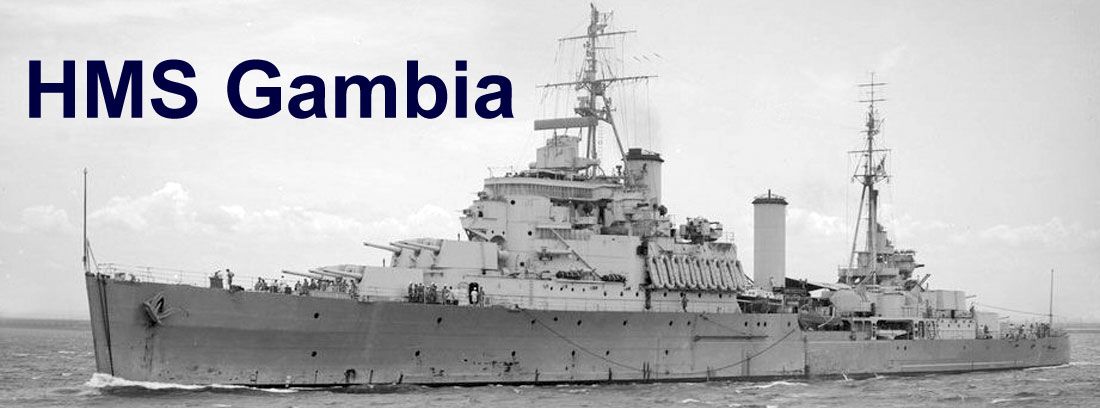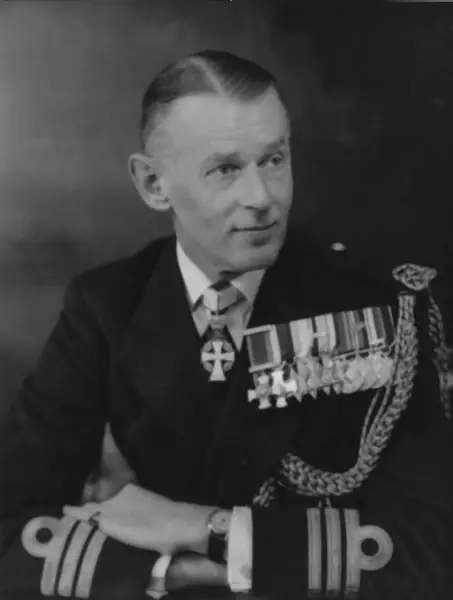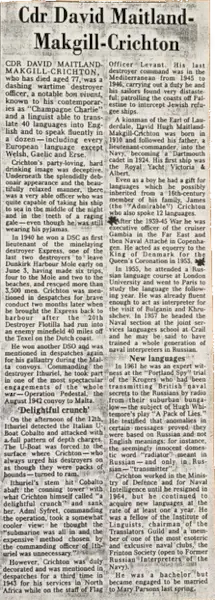
David Hugh Maitland-Makgill-Crichton DSO. DSC. K af D. FIL. TG. TITI. ATA. RN (Retd)
"Courageous Gentlemen Brilliant Linguist"
The above quote comes from his memorial inscription.

David Hugh Maitland-Makgill-Crichton
Image: National Portrait Gallery
David's illustrious career can be found on several places on the internet. He served on HMS Gambia in the far east as Executive Officer from August 15, 1946 to October 1947.
In September 2025, Helen Perry who is the daughter of William Geoffrey Baker who served on HMS Gambia as a stoker from 1946 to 1948, sent me a newspaper cutting of Commander Hugh Maitland-Makgill-Crichton's obituary. The cutting must date from a little after Commander Maitland-Makgill-Crichton's death, which was on November 16, 1987. The cutting reads:
 Cdr David Maitland-Makgill-Crichton
Cdr David Maitland-Makgill-Crichton
Cdr David Maitland-Makgill-Crichton, who has died aged 77, was a dashing wartime destroyer officer, a notable bon vivant, known to his contemporaries as "Champagne Charlie" and a linguist able to translate 40 languages into English and to speak fluently in a dozen - including every European language except Welsh, Gaelic and Erse.
Crichton's party-loving, hard drinking image was deceptive. Underneath the splendidly debonair appearance and the beautifully relaxed manner, there was a very able officer who was quite capable of taking his ship to sea in the middle of the night and in the teeth of a raging gale - even though he was still wearing his pyjamas.
In 940 he won the DSC as first lieutenant of the minelaying destroyer Express, one of the last two destroyers to leave Dunkirk Harbour mole early on June 3, having made six trips, four to the Mole and two to the beaches, and rescued more than 3,500 men. Crichton was mentioned in despatches for brae conduct two months later when he brought the Express back to harbor after the 20th Destroyer Flotilla had run into an enemy minefield 40 miles off the Texel on the Dutch coast.
He won another DSO and was mentioned in despatches again for his gallantry during the Malta convoys. Commanding the destroyer Ithuriel, he took part in one of the most spectacular engagements of the whole war - Operation Pedestal, the August 1942 convoy to Malta.
'Delightful Crunch'
On the afternoon of the 12th, Ithuriel detected the Italian U-Boat Cobalto and attacked with a full pattern of depth charges. The U-boat was forced to the surface where Crichton - who always urged his destroyers on as though they were packs of hounds - turned to ram.
Ithuriel's stem hit Cobalto abaft the conning tower with what Crichton called "a delightful crunch" and sank her. Adml Syfret, commanding the operation, took a somewhat cooler view: he thought the "submarine was all in and the expensive method chosen by the commanding officer of Ithuriel was unnecessary."
However, Crichton was duly decorated and was mentioned in despathes for a third time in 1943 for his services in North Africa while on the staff of Flag Officer Levant. His last destroyer command was in the Mediterranean from 1945 to 1946, carrying out a duty he and his sailors found very distasteful: patrolling hte coasts off Palestine to intercept Jewish refugee ships.
A kinsman of the Earl of Lauderdale, David Hugh Maitland-Makgill-Crichton was born in 1910 and followed his father, a lieutenant-commander, into the Navy, becoming Dartmouth cadetin 1924. his first ship was the Royal Yacht Victoria & Albert.
Even as a boy he had a gift for languages which he possibly inherited from a 16th-century member of his family, James (the "Admirable") Crichton who also spoke 12 languages.
After the 1939-45 War he was executive officer of the cruiser Gambia in the Far East and then Naval Attaché in Copenhagen. He acted as equerry to the King of Denmark for the Queen's Coronation in 1953.
in 1955, he attended a Russian language course at London University and went to Paris to study the language the following year. He was already fluent enough to act as interpreter for the visit of Bulganin and Khrushchev, In 1957 he headed the Naval section at the joint services languages school at Crail and he may be said to have trained a whole generation of naval interpreters in Russian.
New languages
In 1961 he was an expert witness at the "Portland Spy" trial of the Krogers who had been transmitting British naval secrets to the Russians by radio from their suburban bungalow - the subject of Hugh Whitemore's play "A Pack of Lies."
He testified that anomalies in certain messages proved they were based on Russian and not English meanings: for instance, the seemingly innocent domestic word "radiator" meant in Russian - and only in Russian - "transmitter".
Crichton worked in the Ministry of Defence and for Naval Intelligence until he resigned in 1964, but he continued to acquire new languages at the rate of at least one a year. He was a fellow of the Institute of Linguists, chairman of the Translators Guild and a member of one of the most esoteric and exclusive naval clubs, the Frinton Society (open to Former Russian Interpreters of the Navy).
He was a bachelor but became engaged to be married to Mary Parsons last spring.
Sources & Resources
A Hard Fought Ship (Holywell House Publishing)
David Hugh Maitland-Makgill-Crichton (Find a Grave)
David Hugh Maitland-Makgill-Crichton (National Portrait Gallery)
David Hugh Maitland-Makgill-Crichton DSO, DSC, RN (uboat.net)
Royal Navy (RN) Officers 1939-1945 (Unit Histories)